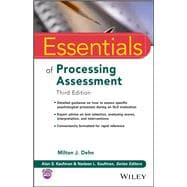A critical handbook for practitioners and clinicians engaged in processing assessments
In the newly revised third edition of Essentials of Processing Assessment, a team of distinguished practitioners delivers an expert framework for planning, conducting, and interpreting an assessment of psychological processes. Emphasizing a pattern-of-strengths-and-weaknesses (PSW) perspective, the book offers an overview of evidence-based interventions for various psychological processes.
In the book, readers will review cognitive processing theories, apply a PSW model for specific learning disability (SLD) identifications, review the relationships between psychological processes and specific kinds of achievement, and detailed information on how to assess 14 different processes covered in the model.
Readers will also find:
- Step-by-step guidelines and worksheets that walk readers through the analysis and interpretation of test results
- Strategies for identifying students with specific learning disabilities
- Information about major cognitive and memory scales, as well as scales designed for processing assessment
An essential handbook for psychologists and other practitioners and clinicians engaged in processing assessments of children and adults, Essentials of Processing Assessment, 3rd Edition will earn a place in the libraries of anyone seeking to make more accurate diagnoses and identify more effective treatments.









